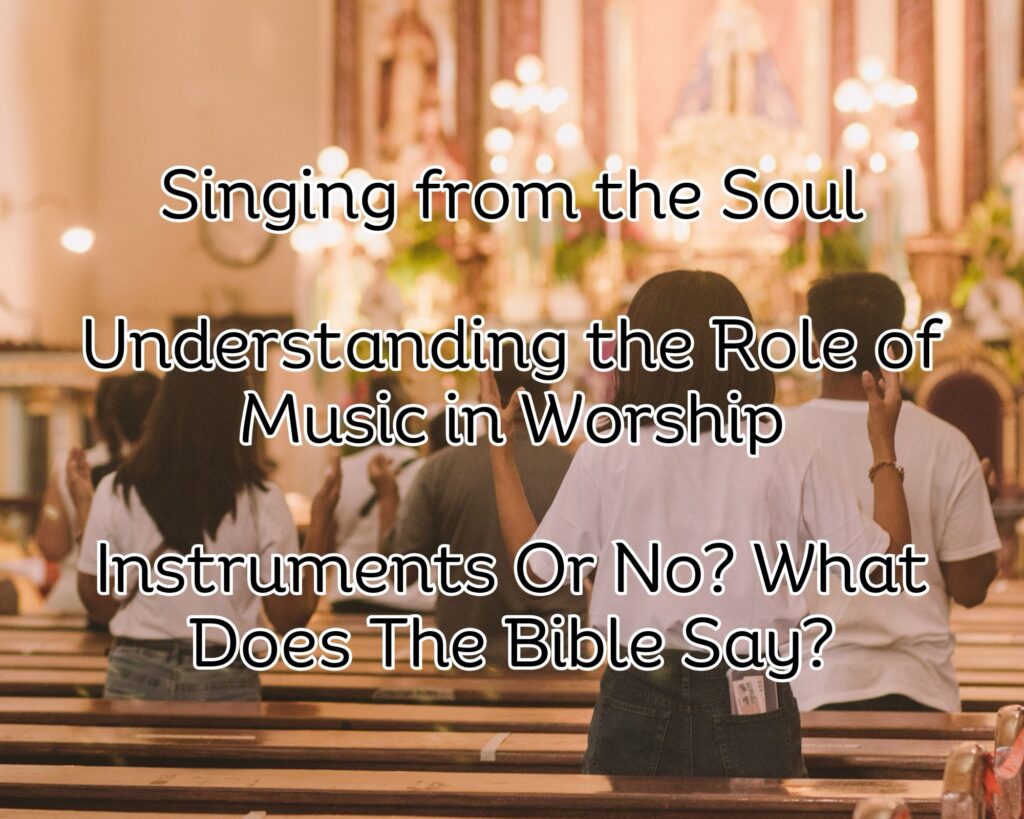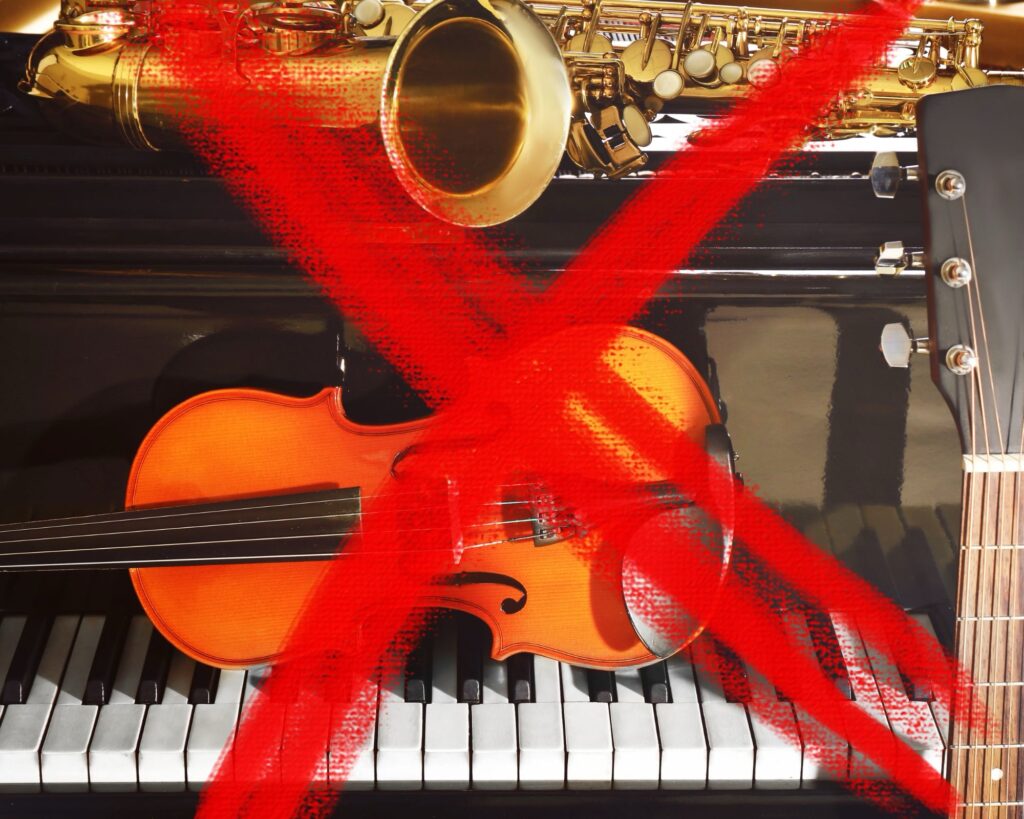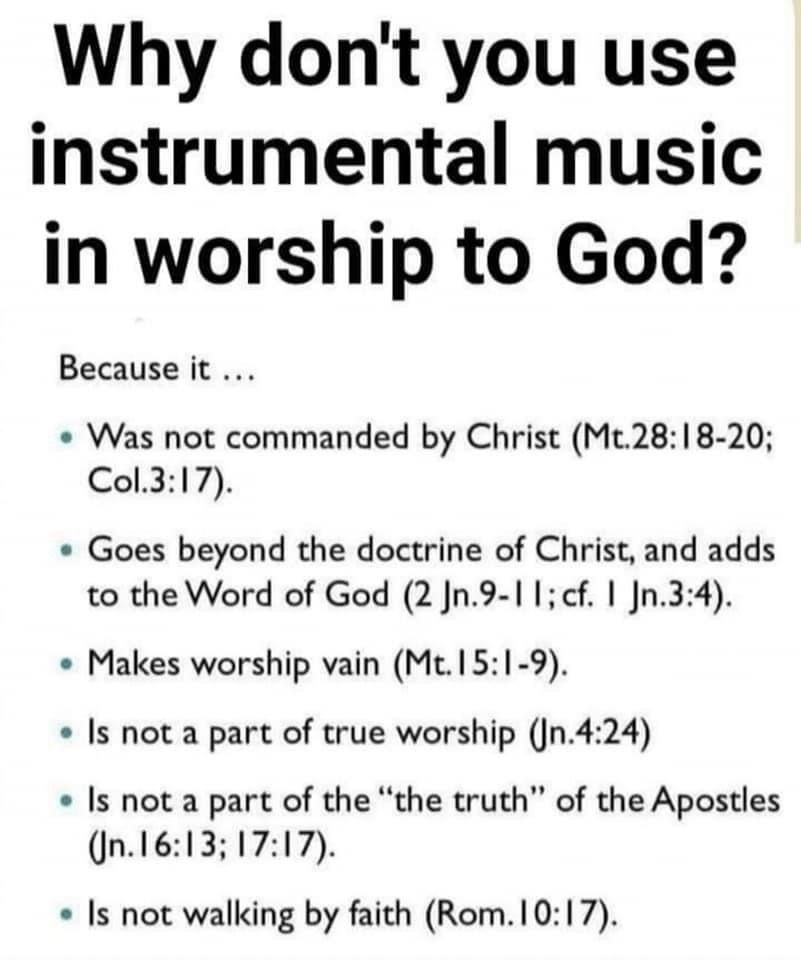Worship holds a central place in the Christian faith, serving as a profound way for believers to express their love, gratitude, and reverence towards God. It’s a time for reflection, prayer, and connection with the divine, often facilitated through music. While music’s role in worship is undisputed, the use of instrumental music in worship settings has been a topic of debate among Christians for centuries.

The essence of worship in Christianity is to honor God in a manner that is both pleasing and acceptable to Him. This involves not only the actions and words of the worshipper but also the heart and spirit from which these offerings arise. Music, with its profound ability to touch the soul, plays a significant role in this expression. However, the question arises: Should this music include instruments, or should it remain purely vocal?
The Bible, the foundational text for Christians, offers guidance on various aspects of life, including worship. While it includes numerous references to musical instruments in worship, particularly in the Old Testament, the New Testament teachings of Jesus Christ and the Apostles provide a framework that some interpret as guiding Christians towards a more vocal-based form of worship. This perspective is rooted in passages that emphasize the importance of words, teachings, and the spirit in worship over the physical elements of musical instruments.
In exploring this topic, we delve into the scriptures to understand why some Christian denominations opt for a cappella worship, focusing on the voice of the congregation as the primary instrument to praise and glorify God. This choice is not merely a preference but is often seen as a reflection of a deeper theological understanding and adherence to the New Testament’s teachings on worship.
As we embark on this exploration, it’s essential to approach the subject with an open heart and mind, seeking to understand the biblical foundations behind the use of music in worship. Whether one’s tradition includes instruments or not, the ultimate goal remains the same: to offer worship that is true, heartfelt, and pleasing to God.
For those interested in further exploring the foundational aspects of Christian beliefs and practices, including the role of music in worship, Finding Hope in Truth: A Christian Guide to Sin, Salvation, and Redemption 📚 provides a comprehensive look into living a life aligned with Christ’s teachings. This guide is an invaluable resource for anyone seeking to deepen their understanding of their faith and how it shapes every aspect of their worship and daily living.

The Commandments of Christ
Central to the discussion of music in worship is the consideration of Christ’s commandments. The teachings of Jesus Christ, as recorded in the New Testament, serve as the bedrock for Christian practice and belief. Two passages, in particular, Matthew 28:18-20 and Colossians 3:17, are often cited in discussions about the nature of Christian worship and its expression through music.
In Matthew 28:18-20, known as the Great Commission, Jesus instructs His disciples, saying, “All authority in heaven and on earth has been given to me. Therefore go and make disciples of all nations, baptizing them in the name of the Father and of the Son and of the Holy Spirit, and teaching them to obey everything I have commanded you.” This passage emphasizes the authority of Christ and the importance of adhering to His teachings as the foundation of Christian faith and practice. The focus is on the verbal proclamation of the Gospel and the teaching of Christ’s commandments, without explicit mention of musical instruments in worship.
Colossians 3:17 further underscores this principle: “And whatever you do, whether in word or deed, do it all in the name of the Lord Jesus, giving thanks to God the Father through him.” This verse calls for all actions and words to be done in Jesus’ name, which includes expressions of worship. The emphasis is on the content of the worship—its alignment with Christ’s teachings and the expression of gratitude to God—rather than the medium through which it is delivered.
These passages highlight a key aspect of Christian worship: it is the message and the heart behind the worship that are of utmost importance. For those who advocate for a cappella worship, these scriptures reinforce the belief that worship should be focused on the teachings of Christ and the words of praise and prayer, rather than the accompaniment of instruments. The absence of a direct commandment from Christ to use instruments in worship is seen as an indication that vocal praise, rooted in the heart and aligned with the Gospel, is the form of musical expression most in keeping with New Testament teachings.
For individuals seeking to ground their understanding of worship and other aspects of Christian life in biblical teachings, How to Be a Christian: Starter Guide 📖 offers a comprehensive overview of the foundational principles of the faith. This resource is invaluable for those wishing to explore the depth and breadth of Christian practice, including the role of music in worship, from a scripturally informed perspective.

Beyond the Doctrine of Christ
The use of instrumental music in worship is viewed by some within the Christian community as going beyond the doctrine of Christ, thereby adding to the Word of God. This perspective is grounded in the teachings found in 2 John 9-11 and 1 John 3:4, which caution against deviating from the teachings of Christ and the apostolic tradition.
2 John 9-11 warns, “Anyone who runs ahead and does not continue in the teaching of Christ does not have God; whoever continues in the teaching has both the Father and the Son.” This passage is interpreted by some to mean that adding elements to worship that were not explicitly endorsed or commanded by Jesus Christ—such as instrumental music—could be seen as going beyond the teachings of Christ. The emphasis here is on maintaining the purity of Christian worship as it was practiced by the early church, which focused on vocal praise and the teaching of the apostles.
Similarly, 1 John 3:4, which defines sin as lawlessness, is sometimes cited in discussions about worship practices. The argument is that by introducing instrumental music into worship without clear New Testament authorization, one might be adding to God’s law, thereby engaging in a form of lawlessness. This interpretation stresses the importance of adhering strictly to the scriptural record, ensuring that worship practices are directly supported by the teachings of Jesus and the apostles.
These concerns about adhering to the doctrine of Christ and avoiding the addition of unauthorized elements into worship reflect a desire to worship God in a manner that is true to the teachings of the New Testament. For those who hold this view, the absence of New Testament instructions to include instrumental music in worship is taken as a directive to maintain a simpler, vocal-focused form of worship that relies solely on the human voice to praise and glorify God.
In the journey of faith, understanding the biblical basis for worship practices is crucial. For those exploring the complexities of Christian doctrine and seeking guidance on living a life that reflects biblical teachings, Embark on a Chronological Bible Journey with Our Reading Plan 📖 provides a structured approach to engaging with the scriptures. This resource is designed to help believers navigate the Bible in a way that enriches their understanding of God’s Word and its application to worship and daily living.

The Vanity of Worship with Instruments
The perspective that instrumental music makes worship vain is rooted in a specific interpretation of Matthew 15:1-9. In this passage, Jesus criticizes the Pharisees and teachers of the law for their adherence to human traditions over the commandments of God, stating, “In vain do they worship me, teaching as doctrines the commandments of men.” This critique is applied by some within the Christian community to the use of instrumental music in worship, arguing that it represents a human addition to the prescribed form of worship, thus rendering it vain in the eyes of God.
The argument hinges on the belief that true worship should be based solely on the directives given by God through Scripture. Since the New Testament does not explicitly command the use of instruments in worship, their inclusion is seen as a human innovation rather than a divine mandate. This viewpoint emphasizes the importance of adhering strictly to the forms of worship that are believed to be sanctioned by Scripture, specifically the vocal praise and prayer that characterized early Christian worship.
The concern is that by focusing on the musical accompaniment, worshippers may be distracted from the heart of worship, which is to glorify God and edify the congregation through the Word. The use of instruments, therefore, is seen not merely as a stylistic choice but as a potential deviation from the purity of worship that Jesus sought to restore, particularly in His interactions with the religious leaders of His time.
This interpretation calls for a return to the simplicity and sincerity of early Christian worship, where the human voice was the primary instrument used to offer praise to God. It underscores the belief that worship should be an expression of the heart’s devotion to God, free from the embellishments that might detract from the worship’s authenticity and spiritual focus.
For those seeking to deepen their understanding of worship and its expression in the Christian life, Bible Reading Plan PDF: Chronological Order of Events 📖 offers a pathway through the scriptures, providing insights into the practices of the early church and the teachings of Jesus that inform contemporary worship. This resource is an invaluable tool for anyone wishing to explore the biblical foundations of worship and to cultivate a practice that is both scripturally informed and spiritually enriching.

True Worship
The concept of true worship, as delineated in the New Testament, particularly through Jesus’ conversation with the Samaritan woman at the well in John 4:24, emphasizes worshiping “in spirit and truth.” This passage is pivotal for understanding the Christian approach to worship, especially in discussions about the role of instrumental music. Jesus states, “God is spirit, and his worshipers must worship in the Spirit and in truth.” This directive guides believers towards a form of worship that transcends physical instruments, focusing instead on the spiritual connection between the worshiper and God.
The emphasis on worshiping in spirit and truth suggests that true worship is not dependent on external forms or rituals but on the internal posture of the worshiper’s heart towards God. It highlights the importance of sincerity, authenticity, and alignment with God’s truth as revealed in Scripture. For those who advocate for a cappella worship, this passage reinforces the belief that the human voice, unaccompanied by instruments, is a powerful and sufficient medium for expressing the depth of one’s devotion and faithfulness to God.
This perspective does not diminish the beauty or potential spiritual significance of instrumental music in other contexts. Instead, it underscores the belief that in the specific context of worship, the focus should be on fostering a direct, unmediated connection with God. By prioritizing vocal praise, worshippers aim to adhere closely to the New Testament model of worship, ensuring that their practices are rooted in the principles of spirit and truth.
The call to worship in spirit and truth invites Christians to reflect deeply on the nature of their worship practices and to consider how these practices align with the teachings of Jesus. It challenges believers to examine whether their forms of worship facilitate a genuine encounter with God, free from distractions and centered on the truths of the Gospel.
For individuals eager to explore the depths of their faith and the biblical underpinnings of worship, How to Be a Christian: Starter Guide 📖 serves as a comprehensive resource. This guide offers insights into the core beliefs and practices of Christianity, including the significance of worshiping in spirit and truth. It is an essential tool for anyone seeking to deepen their understanding of what it means to live and worship according to the teachings of Jesus.

Is Instrumental Music Part of the Apostles’ Truth?
The New Testament provides a foundation for Christian beliefs and practices, including worship. The teachings of Jesus and the Apostles emphasize the importance of adhering to the truth of the Gospel, a principle that extends to how Christians express their worship. In exploring whether instrumental music aligns with the Apostles’ teachings, it’s essential to consider passages like John 16:13 and 17:17, where Jesus speaks about the Spirit of truth guiding believers into all truth and sanctifying them in the truth, which is God’s word.
The absence of explicit instructions or examples of instrumental music in the New Testament worship gatherings leads some to conclude that vocal praise was the norm for the early church. This perspective is supported by the emphasis on the word of Christ dwelling richly in believers as they teach and admonish one another with all wisdom through psalms, hymns, and songs from the Spirit, singing to God with gratitude in their hearts (Colossians 3:16). The focus is on the content of the worship—expressed through words and melodies generated by the human heart and voice—rather than the accompaniment of musical instruments.
This approach to worship is seen as walking by faith, as described in Romans 10:17, where faith comes from hearing the message, and the message is heard through the word about Christ. The implication is that faith-based worship is rooted in the proclamation and reception of the Gospel, facilitated by the clarity and simplicity of vocal expression.
For those who view instrumental music as not part of the Apostles’ truth, the priority is to maintain a form of worship that is faithful to the New Testament model. This model emphasizes the spiritual and relational aspects of worship—connecting with God and edifying the church through the word and heartfelt praise.
In navigating the complexities of faith and worship practices, believers are encouraged to engage deeply with Scripture. Embark on a Chronological Bible Journey with Our Reading Plan 📖 offers a structured way to explore the Bible, providing insights into the early church’s practices and the Apostles’ teachings. This resource is invaluable for those seeking to align their worship with the principles found in the New Testament, fostering a deeper understanding and appreciation of the Christian faith.

Does Walking by Faith Exclude Instrumental Music in Worship?
The concept of walking by faith, particularly as it pertains to worship practices, is deeply rooted in the Christian tradition. Romans 10:17, “So then faith comes by hearing, and hearing by the word of God,” emphasizes the importance of the Word in the development and expression of faith. This scripture is central to the discussion on whether instrumental music has a place in Christian worship, suggesting that faith is built upon and nourished by the direct reception of God’s Word.
This perspective posits that worship practices, including music, should facilitate the clear communication and contemplation of the Word. The argument against instrumental music in worship settings is that it might distract from or overshadow the Word, potentially hindering the faith-building process. The focus on vocal music alone is seen as a way to ensure that the Word of God remains central in worship, allowing the message to be heard and absorbed without the potential distraction of instrumental accompaniment.
However, this viewpoint does not universally apply across all Christian denominations. Many believe that instrumental music, when used thoughtfully and reverently, can enhance the worship experience, helping to elevate the hearts and minds of the congregation towards God. For these believers, instruments in worship are seen as tools that can support the message of the Gospel, enriching the worship experience rather than detracting from it.
The question of whether walking by faith excludes instrumental music in worship is ultimately one that each believer and faith community must answer for themselves, guided by their understanding of Scripture, the leading of the Holy Spirit, and the traditions of their faith. It invites a thoughtful consideration of how best to foster an environment where faith can flourish, and where worship in spirit and truth is the paramount goal.
For those exploring the foundations of their faith and seeking guidance on how to live it out in their daily lives and worship practices, Bible Reading Plan PDF: Chronological Order of Events 📖 provides a comprehensive journey through the Scriptures. This resource aids believers in understanding the biblical narrative in its entirety, offering insights into the principles of faith and worship that have guided Christians since the early church.
As an Amazon Associate we earn from qualifying purchases through some links in our articles.



